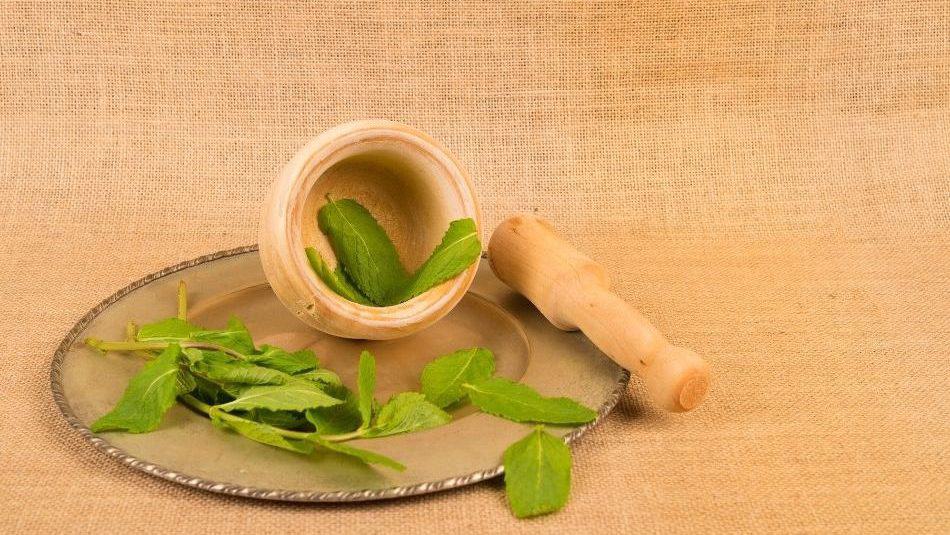
PCOS (Polycystic Ovary Syndrome) can be successfully managed through dietary and lifestyle changes but many herbs such as spearmint tea also appear to be highly effective in the treatment strategy of this condition.
So what are the benefits of drinking spearmint tea for PCOS? Can its consumption really help reduce PCOS symptoms and are there any side effects associated with this herb? That’s what you’ll find out in this evidence-based article where I also share some practical tips on how to best use spearmint tea for PCOS.
If you’d like to get more tips on how to manage PCOS through lifestyle changes, make sure you check out my previous article ‘How To Treat PCOS Naturally (Science-Based Guidelines)‘ to get more information.
What is spearmint tea?
Spearmint tea is a type of herbal tea that is naturally caffeine-free as it’s made from the leaves of spearmint (Mentha Spicata Labiatae). In relation to PCOS, spearmint is probably the most studied herb that has repeatedly shown multiple benefits in the management of PCOS.
As a result, drinking spearmint tea is now recommended by many health professionals as a part of an effective PCOS treatment strategy. And there are many good reasons for it.
Benefits of spearmint tea for PCOS:
- Decreased androgen levels
- Improved fertility
- Digestive health support
- Stress management
✓ Decreased androgen levels
Multiple studies have shown that drinking spearmint tea (2 cups per day) can significantly lower the levels of androgens (the ‘male’ hormones) in women with PCOS (up to 30%), in particular free testosterone. This can be especially beneficial for those individuals whose PCOS symptoms involve hirsutism, acne, hair loss and other typical high testosterone-related signs.
In fact, a few studies have even demonstrated improvements in hirsutism (less facial hair) and acne in women with PCOS after the consumption of spearmint tea for 1 month. While this is a relatively short period of time to detect any big physical changes in your body, it is possible that the strong anti-androgen effects of spearmint tea are responsible for those improvements.
I personally suffered from severe hormonal acne as a result of my PCOS and I started registering some big improvements in my skin after about 3 months of regular spearmint tea consumption.
While there were other important things I changed during that time that also helped improve my skin condition, I still include spearmint tea in my diet on a regular basis (and my skin has been steadily clear for a long time now).
✓ Improved fertility
Apart from the spearmint’s ability to decrease androgens (the ‘male’ hormones) in the blood, it also appears to be effective in balancing LH and FSH (the ‘female’ hormones) levels in women with PCOS. Because LH (luteinizing hormone) and FSH (follicle-stimulating hormone) play a key role in ovulation, menstrual cycle and egg maturity, their optimal levels are essential for female fertility.
As it’s been demonstrated in multiple studies, women with PCOS tend to have abnormal levels of LH and FSH in their bodies. Since they typically suffer from irregular periods and inconsistent ovulation, they are at increased risk of infertility.
However, most women with PCOS are able to conceive naturally and experience a healthy pregnancy once their hormonal balance is restored. And drinking spearmint tea can be a great way to support hormonal balance and fertility as it’s been shown in many clinical trials.
✓ Digestive health support
Digestive problems and abdominal bloating are not uncommon in women with PCOS due to their metabolic and hormonal dysfunctions. In fact, women with PCOS are also at increased risk of developing IBS (irritable bowel syndrome). The good news is that spearmint tea was originally used to relieve digestive upsets, bloating and abdominal pain.
It is believed that those effects might be due to the presence of carvone which is a chemical compound associated with easing digestion and inhibiting intestinal muscle contractions. In one study, supplementing with a spearmint-containing product was effective in reducing IBS symptoms in the studied subjects.
So if you suffer from PCOS and you often experience digestive issues after eating, drinking spearmint tea may help reduce some of those discomforts.
✓ Stress management
Spearmint tea is also rich in multiple powerful antioxidants (such as rosmarinic acid, flavones, limonene and menthol) that help protect against free radicals and reduce oxidative stress.
It has been shown that too much oxidative stress can lead to a variety of chronic conditions including diabetes and PCOS which is why a diet rich in antioxidants can be a powerful tool in the prevention and management of those disorders.
Additionally, there is also some evidence suggesting that spearmint tea might have relaxing effects with the potential to reduce anxiety and improve sleep (both extremely important for PCOS). This may be due to the presence of menthol that is known for its sedative effects on the body.
However, the relaxing and stress-relieving effects could also be attributed to the spearmint’s ability to interact with GABA receptors associated with nerve function. While more evidence on those effects of spearmint tea is needed, any potential stress-relieving strategies such as drinking spearmint tea can strongly benefit women with PCOS.
Disadvantages of spearmint tea for PCOS:
- Access
- Quality
✕ Access
In general, there seem to be only minimal risks associated with the consumption of spearmint tea (when not consumed in excessive amounts) which is why it is a great and safe choice for most women with PCOS. However, if you’re pregnant, breastfeeding or on some prescribed medication, you should still discuss it with your medical doctor.
The biggest issue you might experience with spearmint tea is the limited access to this herb in most places. While this will be highly dependent on the region you live in, you’re more likely to find peppermint tea (or peppermint/spearmint blends) in the vast majority of stores and supermarkets in your area.
While peppermint is also great and offers multiple health benefits, it has a different chemical content in comparison to spearmint which is why it won’t have the same effects on PCOS.
The good news is that you can easily find pure spearmint tea in many online shops, including Amazon, so you can order in bulk and always keep it on hand (my favorite brands of spearmint tea are listed later in this post). Small local herbal stores might also be worth exploring as they often offer a variety of loose herbs on a weight basis.
✕ Quality
If you decide to consume spearmint tea for its health benefits and medicinal properties, I highly suggest you choose a high-quality brand to get the most out of it. Try to look for a brand certified as organic to minimize the exposure to pesticides, herbicides and other industrial chemicals that may disrupt your hormones.
Keep in mind that some lower-quality tea sold in tea bags may also contain other unwanted items (such as dust and sand) although it is not true for all brands. Nonetheless, loose leaf tea is always a better (and more eco-friendly) option since it usually contains larger and more aromatic leaves providing you with a better taste as well.
Best spearmint tea for PCOS:
- Organic spearmint tea
- Loose-leaf spearmint tea
- Fresh-leaf spearmint tea
- Spearmint green tea
There are many different ways in which you can make spearmint tea to fit your preferences. Most commonly, it is prepared from dried spearmint leaves that you can buy either loose or bagged. However, you can also make a delicious spearmint tea from fresh spearmint leaves as you can easily grow your own spearmint plant at home.
In terms of the quality, it’s best to look for organic loose-leaf spearmint tea whenever possible as I already mentioned above.
When picking your spearmint tea for PCOS, make sure that it really contains the leaves of spearmint since it can be easily mistaken for other types of mint, especially peppermint.
You may also find different types of tea blends consisting of more than just one herb. Spearmint in combination with green tea can be especially beneficial for women with PCOS since green tea may provide extra health benefits.
To find out more about the benefits of green tea for PCOS, you can read my previous article ‘Green Tea For PCOS: Benefits, Risks & Practical Tips‘.
Is spearmint tea good for PCOS?
Spearmint tea is a good beverage for women with PCOS as it’s been linked to multiple health benefits important for the management of this condition. Regular consumption of spearmint tea may help decrease testosterone levels, improve fertility, reduce stress and support digestive health.
Spearmint vs peppermint tea for PCOS
According to research, spearmint tea in comparison to peppermint tea is a better option for women with PCOS due to its proven hormone-balancing properties. While both herbs come from the same mint plant family, they differ in terms of their taste, chemical content and effects on health and PCOS.
Best spearmint tea brands for PCOS:
- Organic Spearmint Leaf Tea Bags by FGO (available on Amazon)
- Organic Spearmint Green Tea by Organic Positively Tea Company (available on Amazon)
- Organic Loose-leaf Spearmint Tea by Frontier (available on Amazon)
I personally find it quite challenging to buy pure (and good quality) spearmint tea from regular shops in the area I live in. Most of them are either in a blend or come only in teabags which can become quite expensive over time if you drink a couple of cups every day. That’s why I normally order in bulk from online stores and these (listed above) are some of my favorite brands.
How to use spearmint tea for PCOS:

Spearmint tea can be easily incorporated into a diet in many different ways and forms. Depending on the type and brand of spearmint tea, the effects on PCOS may vary. However, there are some general recommendations based on the research findings that may be followed to maximize the positive effects.
How much spearmint tea should I drink for PCOS?
As a general rule, women with PCOS should drink between 2-4 cups of spearmint tea per day to gain the most health benefits. However, the optimal dosage of spearmint tea may differ between individuals depending on their personal circumstances and other external factors.
When is the best time to drink spearmint tea for PCOS?
The best time to drink spearmint tea for PCOS appears to be after meals since it may help relieve bloating and support digestion. However, spearmint tea can be consumed at any time of the day as it’s naturally caffeine-free and therefore won’t cause any sleep disturbances.
How long does spearmint tea take to work and lower androgens?
In general, most women with PCOS start noticing significant improvements in their symptoms such as acne and hirsutism after around 3 months of regular spearmint tea consumption. However, the length of this period may be affected by the severity of hormone imbalances and other important factors.
How to make spearmint tea for PCOS:
- Pick a high-quality spearmint tea of your choice
- Place dried or fresh spearmint leaves into a cup (via infuser, filter or teabag)
- Boil fresh water to 100 degrees
- Pour 1 cup of freshly boiled water into your prepared cup
- Let it brew for 5-10 minutes
- Enjoy on its own or add a sweetener of choice
Practical tips:
- Drink spearmint tea hot & cold – spearmint tea tastes great not only as a hot beverage but it’s also great cold (it’s very refreshing), especially in the summertime when you can keep it in your fridge, add some lemon, ice and make a delicious iced tea
- Make spearmint tea blends – try mixing spearmint tea with other PCOS-friendly herbs of your choice to create even better flavor and get additional health benefits, you can make your own tea blends at home or in your local herbal store or find some already pre-made tea products, you can find a complete list of the best herbs and teas for PCOS here ‘What Type Of Tea Is Best For PCOS? (The Ultimate Guide)‘
- Add spearmint tea into smoothies – spearmint tea (in its liquid form) can be easily added into your smoothies and smoothie bowls if you’re short on time & want to increase your spearmint tea intake, it can be hardly tasted but it can easily replace your regular liquids used for smoothies
- Make spearmint tea your evening routine – spearmint tea is naturally caffeine-free so you can drink it even closer to bedtime, it’s a great way to finish your day as well as your ‘eating window’, it can help you digest your last meal, prevent late snacking and ‘unwind’ before bed if you make it your daily routine
- Re-infuse your spearmint leaves – if you have a high-quality and aromatic spearmint tea (loose-leaf), you can actually re-use the leaves to make more tea from one portion, it’s important not to brew the tea for too long (approx. 5 mins) so you can re-infuse the leaves with more hot water later
Resources:
- Akdoğan, M., Tamer, M. N., Cüre, E., Cüre, M. C., Köroğlu, B. K., & Delibaş, N. (2007). Effect of spearmint (Mentha spicata Labiatae) teas on androgen levels in women with hirsutism. Phytotherapy research : PTR, 21(5), 444–447. https://doi.org/10.1002/ptr.2074
- Caro, D. C., Rivera, D. E., Ocampo, Y., Franco, L. A., & Salas, R. D. (2018). Pharmacological Evaluation of Mentha spicata L. and Plantago major L., Medicinal Plants Used to Treat Anxiety and Insomnia in Colombian Caribbean Coast. Evidence-based complementary and alternative medicine : eCAM, 2018, 5921514. https://doi.org/10.1155/2018/5921514
- Cirlini, M., Mena, P., Tassotti, M., Herrlinger, K. A., Nieman, K. M., Dall’Asta, C., & Del Rio, D. (2016). Phenolic and Volatile Composition of a Dry Spearmint (Mentha spicata L.) Extract. Molecules (Basel, Switzerland), 21(8), 1007. https://doi.org/10.3390/molecules21081007
- Grant, P., & Ramasamy, S. (2012). An update on plant derived anti-androgens. International journal of endocrinology and metabolism, 10(2), 497–502. https://doi.org/10.5812/ijem.3644
- Grant P. (2010). Spearmint herbal tea has significant anti-androgen effects in polycystic ovarian syndrome. A randomized controlled trial. Phytotherapy research : PTR, 24(2), 186–188. https://doi.org/10.1002/ptr.2900
- Mathur, R., Ko, A., Hwang, L. J., Low, K., Azziz, R., & Pimentel, M. (2010). Polycystic ovary syndrome is associated with an increased prevalence of irritable bowel syndrome. Digestive diseases and sciences, 55(4), 1085–1089. https://doi.org/10.1007/s10620-009-0890-5
- Mehraban, M., Jelodar, G., & Rahmanifar, F. (2020). A combination of spearmint and flaxseed extract improved endocrine and histomorphology of ovary in experimental PCOS. Journal of ovarian research, 13(1), 32. https://doi.org/10.1186/s13048-020-00633-8
- Sadeghi Ataabadi, M., Alaee, S., Bagheri, M. J., & Bahmanpoor, S. (2017). Role of Essential Oil of Mentha Spicata (Spearmint) in Addressing Reverse Hormonal and Folliculogenesis Disturbances in a Polycystic Ovarian Syndrome in a Rat Model. Advanced pharmaceutical bulletin, 7(4), 651–654. https://doi.org/10.15171/apb.2017.078
- Souza, F. V., da Rocha, M. B., de Souza, D. P., & Marçal, R. M. (2013). (-)-Carvone: antispasmodic effect and mode of action. Fitoterapia, 85, 20–24. https://doi.org/10.1016/j.fitote.2012.10.012
- Teede, H. J., Misso, M. L., Costello, M. F., Dokras, A., Laven, J., Moran, L., Piltonen, T., Norman, R. J., & International PCOS Network (2018). Recommendations from the international evidence-based guideline for the assessment and management of polycystic ovary syndrome. Fertility and sterility, 110(3), 364–379. https://doi.org/10.1016/j.fertnstert.2018.05.004
- Vejdani, R., Shalmani, H. R., Mir-Fattahi, M., Sajed-Nia, F., Abdollahi, M., Zali, M. R., Mohammad Alizadeh, A. H., Bahari, A., & Amin, G. (2006). The efficacy of an herbal medicine, Carmint, on the relief of abdominal pain and bloating in patients with irritable bowel syndrome: a pilot study. Digestive diseases and sciences, 51(8), 1501–1507. https://doi.org/10.1007/s10620-006-9079-3
- Watt, E. E., Betts, B. A., Kotey, F. O., Humbert, D. J., Griffith, T. N., Kelly, E. W., Veneskey, K. C., Gill, N., Rowan, K. C., Jenkins, A., & Hall, A. C. (2008). Menthol shares general anesthetic activity and sites of action on the GABA(A) receptor with the intravenous agent, propofol. European journal of pharmacology, 590(1-3), 120–126. https://doi.org/10.1016/j.ejphar.2008.06.003
